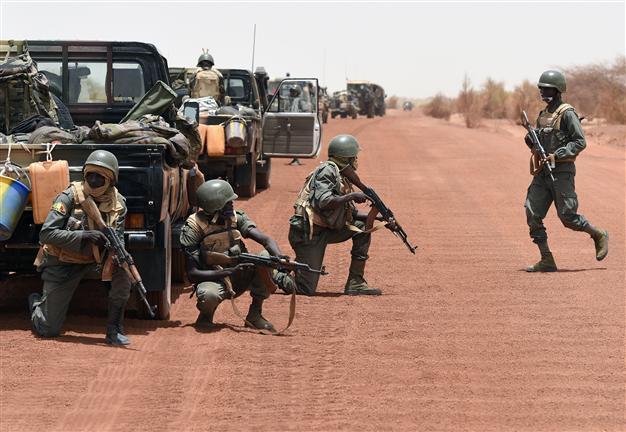Mali close to peace deal after militia leaves key town
BAMAKO - Agence France-Presse

Soldiers of the Malian Army Forces secure the pist between Goundam and Timbuktu, northern Mali, on June 2, 2015, during the joint operation "La Madine 3", part of the Operation Barkhane, an anti-terrorist operation in the Sahel. The head of Mali's main Tuareg-led rebel groups said on June 5, 2015, his movement will sign a final peace deal on June 20 to end the conflict in the west African nation. AFP Photo
Mali's warring factions on June 18 looked close to signing a landmark peace deal to end years of unrest after pro-government militia leaders agreed to evacuate a flashpoint town and the government dropped arrest warrants for several rebels."After talks with mediators and partners, we the GATIA (a pro-government militia) have decided to facilitate the process of pulling out from Menaka," the group's general secretary Haballa Ag Hamza told AFP, adding that the withdrawal will start on June 19.
"We want peace, we're making an important gesture, but it's clear that it is the UN mission which must ensure the safety of Menaka's population, and not another group," he said.
Loyalist militias seized Menaka from the west African country's Tuareg-led rebel alliance in April, in an operation which has sparked several violations of a ceasefire agreement and left many dead on both sides.
The move threatened to undermine the country's already fragile and long-running peace process, which seeks to end years of bloody insurgency by Tuareg and other armed militias in the country's volatile northern desert.
Fighters from the rebellion, known as the CMA, are due on June 20 to sign the Algiers Accord, a peace deal hammered out under the auspices of the UN that has already been rubber-stamped by the government and loyalist armed groups.
A person close to the UN mission in Mali, MINUSMA, confirmed a deal had been struck to evacuate pro-government forces from the northeastern town, which lies close to the Nigerian border.
"GATIA has agreed to leave Menaka. The last obstacle for Saturday's [June 20] ceremony has been lifted," the source said on condition of anonymity.
A source close to the preparations for the signing of the accord said the delegation of rebels was expected on June 18 night in Bamako while another 80 people are expected on Friday from the northeastern rebel stronghold of Kidal.
The UN Security Council on June 18 said it was waiting for the CMA to sign the Algiers Accord, calling on both sides to abstain from any actions that could threaten the peace process.
In a statement, the council urged the armed groups "to demonstrate responsibility and courage in the supreme interest of peace in Mali".
Earlier, the Malian government lifted arrest warrants issued in 2013 against several CMA rebels in a further attempt to smooth the path to peace.
"The arrest warrants issued against CMA officials have been withdrawn at the request of the Malian government," a government source told AFP, without specifying which officials the warrants covered.
"The measure can be considered as a sign of appeasement, just days before the signing of the peace agreement by rebels."
Rebel Almou Ag Mohamed confirmed to AFP that the government had lifted warrants against 15 CMA figures in order to "create a favourable environment" for signing the peace accord in Bamako.
Ramtane Lamamra, the foreign minister for Algeria, which has been leading international efforts to mediate the peace talks, is expected June 19 in the Malian capital to sign the deal, Algerian press agency APS reported.
Mali was shaken by a coup in 2012 that cleared the way for Tuareg separatists to seize towns and cities in the vast northern desert, who were then overpowered by Al-Qaeda-linked militants.
Despite a French military offensive, the country remains riven by ethnic conflict, with the Tuareg and Arab people of the north accusing groups in the more prosperous south of treating them as second-class citizens.
















